#tang poems
Text
Closely connected to the act of name signing was the act of writing poems on walls. As scholars have already pointed out, with beginnings traceable to the Six Dynasties, wall poems (tibishi) were already very widespread during the Tang. By Christopher Nugent's count, well over one thousand entries in the Complete Tang Poems had titles indicating that they began as inscriptions on some surface other than paper or scrolls. These surfaces included walls at places of gathering and transit, such as post stations, scenic sites, inns, and increasingly in the latter part of the Tang, Buddhist temples, which also served public roles for lay gatherings and performances. (100)
In one anecdote, a latecomer casts aspersions on a first writer's literary skills, comparing him to the general Xiang Yu (232-202 BCE), who was infamous for having learned just enough writing to manage his name: "Li Tang signed his name on a pavilion in Zhaoying County. When Wei Zhan [jinshi degree 865] saw it, he took a brush and dashed off a taunt: 'The rivers of Wei and Qin brighten the eyes, / but why is Xiren short on poetic spirit? / Perhaps he mastered only what Beauty Yu's husband could / learning to write just enough to put down his name.' " ... It would not be a stretch to imagine the sniggering of those who read this inscription in a frequented pavilion. (102)
For a degree seeker in Chang'an, these circuits of information and judgment received more discussion than the actual examination itself. Tang literati wrote copiously about activities such as name signing, public exposure, and triumph. It would not be an exaggeration to say that in ninth-century temples and popular recreation areas, the vertical spaces were teeming with verses that clamored for attention. (104)
selections on poetic graffiti from linda rui feng's city of marvel and transformation: chang'an and narratives of experience in tang dynasty china (university of hawaii press, 2015)
#china#tang dynasty#tagamemnon#<- couldn't stop thinking about graffiti from pompeii while reading this chapter so i suspect it may be of interest to rome-heads in genera#this was very promising book that felt like it failed to fully deliver - can't tell if the author was trying not to get into aspects which-#-have a paucity of surviving sources or if perhaps she was trying to avoid stepping on the toes of existing scholarship#e.g. nugent's mentioned book on poetry production/circulation or juduth zeitlin's article on wall poems and anxieties of loss#but even though i felt like it needed another 50-100 pages of fleshing out there are some generally remarkable moments in here#bits that can be put in remarkable parallel with imperial rome certainly; more fascinatingly with 19th- and early 20th-century fiction-#-that deals closely with 'new' modern urban life. where the forms & patterns of the city itself collude with residents against the newcomer#some interesting notes on bai juyi in here too. though i don't know if they're news to any real bai juyi stans out there
36 notes
·
View notes
Text
We tell ourselves all love is foolishness--
And still disappointment is a lucid madness.
Li Shangyin, Untitled Poems
#Li Shangyin#Untitled Poems#Poems of the Late Tang#love#love quotes#foolishness#disappointment#madness#Tang poetry#Chinese poetry#poetry#poetry quotes#quotes#quotes blog#literary quotes#literature quotes#literature#book quotes#books#words#text
26 notes
·
View notes
Text
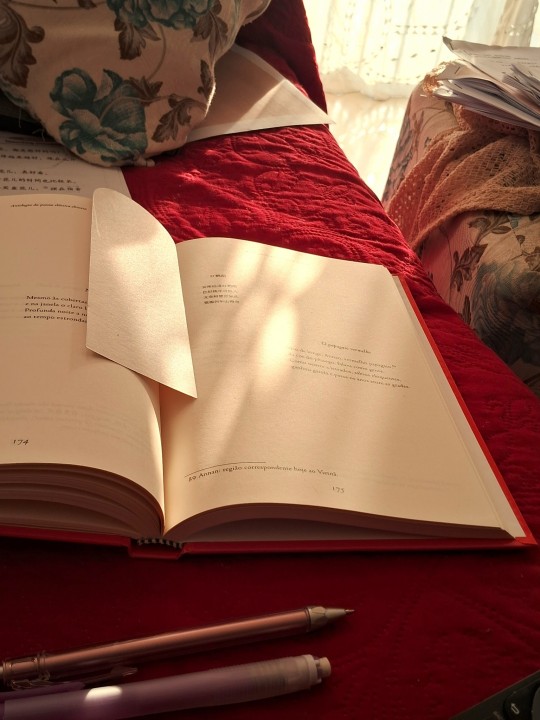
Book of Tang poetry (and messy piles of pages from New Practical Chinese Reader) on the couch in the sunset on a lazy Sunday afternoon
The book is open on 白居易 (Bai Juyi)'s 红鹦鹉 (Red Parrot).
There are many unknown characters for me and English translations I've found are a bit different from the Portuguese translation on the book, and on my very quick search I've already found criticism on them... so here's a translation of the translation:
The Red Parrot
Came from far, Annan*, a red parrot.
The color of peach, spoke like a person.
As happens to wise, eloquent scholars,
Got a cage and spends the years between bars.
*present-day Vietnam
#personal#poetry#chinese poetry#tang dynasty#bai juyi#白居易#translation#chinese poem#langblr#studyblr#chinese langblr
31 notes
·
View notes
Text
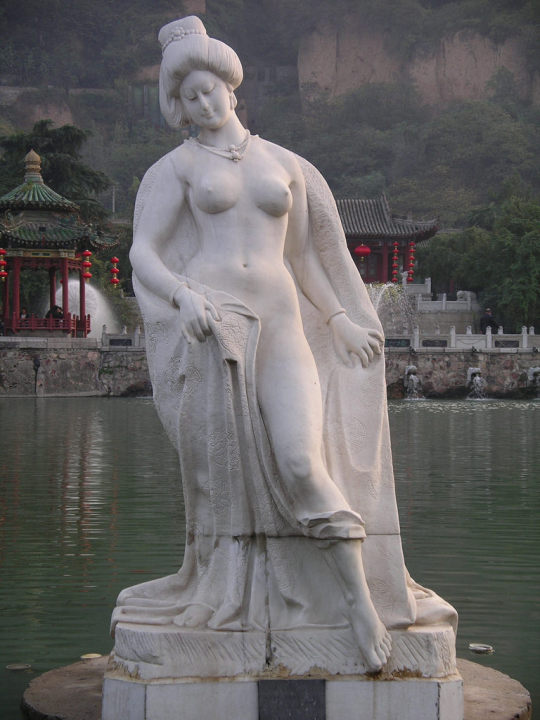
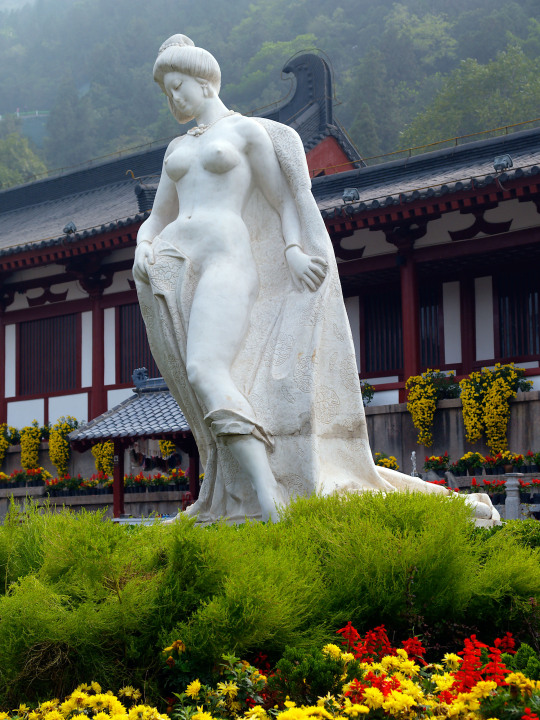

Statue of Yang Guifei at Huaqing Pool 20th-21st C. CE
"The waters of the [Huaqing pool] hot springs were smooth, and washed over her pale white skin.
The palace maids helped her to leave the pool, because she was too delicate and lacked strength.
She had dark black hair, and the face of a flower, with golden jewelry dangling from her hair.
The sound of the war drums from Yuyang began to shake the earth,
And broke the spell of the Song of rainbow skirts and feather robes.
Smoke and dust descended upon the nine layered watchtowers of the imperial palace,
Traveling more than one hundred li from the western gate of the capital.
The six armies of the emperor refused to advance any further, so the emperor was left without a choice,
The writhing fair maiden, whose long and slender eyebrows resembled the feathery feelers of a moth, died in front of the horses.
Her ornate headdress fell to the ground, and nobody picked it up;
Then her kingfisher hair ornament, her gold sparrow hairpin and her jade hair clasp.
His Majesty covered his face, for he could not save her.
Looking back, he saw a stream of blood and tears mixing together."
-Composed by Bai Juyi in the year 806, The Song of Everlasting Regret (or Sorrow) details the events surrounding the death of the lady Yang Guifei during the Anshi [An-Lushan] Rebellion in 755.
#chinese art#chinese history#tang dynasty#ancient history#ancient china#history#literature#poems and poetry#art#antiquities#sculpture#statue#ancient literature
38 notes
·
View notes
Photo
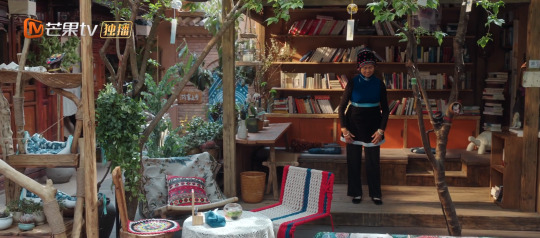

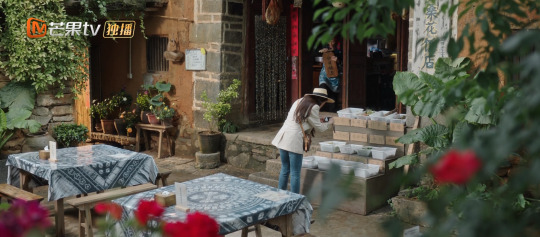
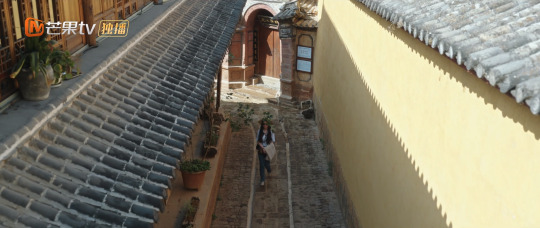

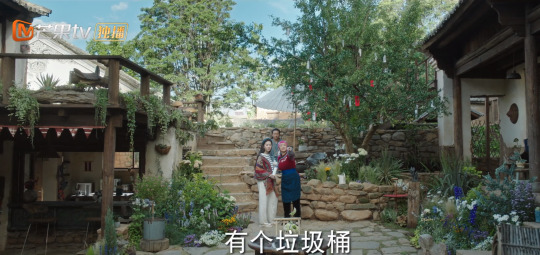




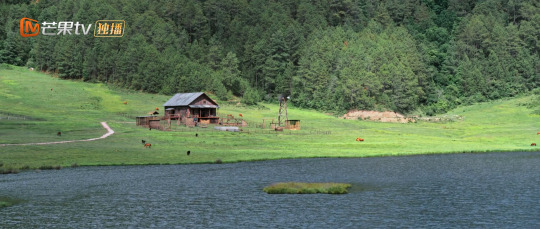

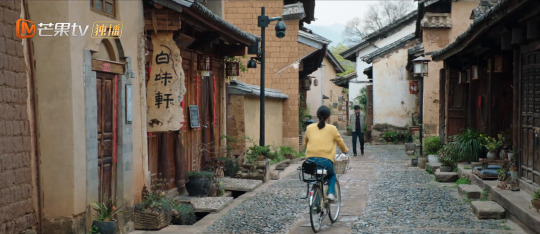
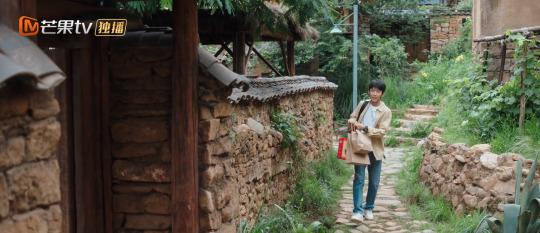
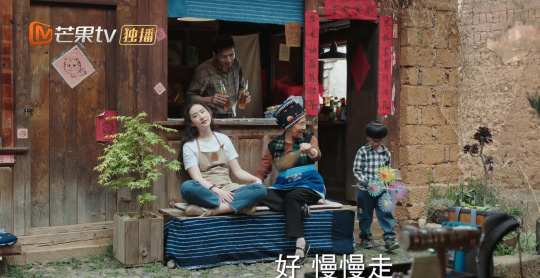
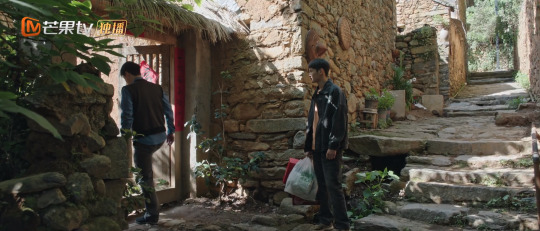
去有风的地方meet yourself (qu youfengde difang/going somewhere windy)
#china#cdrama#this drama is soothing and healing#with gorgeous scenery shots#every character is worth to watch#very soothing but not boring at all#i laugh and snort#sometimes in tears#also the scenery and landscape and architecture#soooo beautiful#but mango tv what's wrong with you#remove that big ugly logo from the screen#anai grandma i love her so much#she is grandma of xie zhiyao#i also love the name of xu hongdou许红豆#hongdou红豆(red bean)#it's from a tang poem#The red beans grow in southern land.#How many load in spring the trees?#Gather them till full is your hand;#They would revive fond memories.
184 notes
·
View notes
Text
Suntang Fic (Still On Going)

I used to write previous Suntang fics, but most of them I ended up deleting them 'cause I didn't have the guts to post them on ao3. Plus, I was insecure with the way I write because I thought it wasn't good enough and cringey. But, I say "freak it, I'mma do it anyways" since I have Suntang Scenarios in my head that keep driving me insane and I thought I might as well write it out.
But, here's a poem that I made for my fic that's going to be a part of it. I guess I would call it a trailer fic or a sneak peak of it (don't really know the right word for it), but anyways. I think this is the most of I've written and the one that doesn't make me want to hate and delete it. I'm not sure how much more I'll be writing, hopefully I can finish this soon.
Oh, and before I could forget, this is based on the Monkey King Reborn (2021) movie because I can't seem to find any 21Suntang fics anywhere. So I might as well write it myself, I'm not sure if I'll get anyone in character based on the movie, but I'll see how it goes 🙃.
"You're All I See"
When I opened my eyes, I used to see your silhouette underneath the moonlight.
How it moves, twirls, and sways in grace in time with your figure.
It soothes something in me that I could never seem to find the words for it.
For your presence brings me serenity and settles down the storm that rages within me,
And tunes out the sonance of the world that has left my mind in a spin.
As your presence and silhouette alone, makes everything quieter
And leaves me craving for your attendance only to silence everything around me.
But it is all but a dream that I could no longer grasp in reality.
For when I open my eyes upon my slumber, and the moon is full and bright.
I see your figure once again underneath the moonlight,
But I could no longer see your silhouette once again
And I’m left mourning in your presence.
- Unknown Springs, 23/08/2024
#journey to the west#suntang#sun wukong#tang sanzang#jttw#kongzang#monkey king reborn#sun wukong x tang sanzang#wukong x sanzang#zhu bajie#sha wujing#pigsy#Sandy#poetry#poem#original poem#writers and poets#fanfic#fanfiction#ao3 fanfic
13 notes
·
View notes
Text

Tang really is a touch too relatable sometimes
(Poem below read more)

#jazzper’s art#lego monkie kid#lego monkie kid tang#lmk tang#lmk season 3#cicada#poem#Lego monkie kid fanart
78 notes
·
View notes
Note
Any chance you could explain the five poem references in the chorus of 山外? 👀👀👀
(I love love love ur tls and the accompanying notes for context/elaboration, you put so much thought and effort into them and it shows!! Just read ur tl of Hen Bie and cried ;-;)
i'll take any chance to obsess over classical chinese poetry so i'd be delighted to :D ty for finally giving me the motivation to flesh out my explanations of them in my translation bc i've been too lazy to do it before this, but also you might regret having asked me this by the time you finish reading this post lol
also i'm rly rly glad you liked my tl of henbie! the last line still gives me ulcers every time i think about it, it was so difficult 😭
anyway so 山外 chorus!! it has eight lines split into two stanzas and the first three lines of each stanza is a poetic reference which is absolutely insane to me?? lyricist大大 真是太佩服您了
the first line of both stanzas is 山外青山楼外楼 / beyond the mountains are yet more verdant mountains—beyond the towers are yet more towers. i translated it a bit more literally to get the parallel structure, but a more figurative translation might be something like an unending expanse of verdant mountains—the buildings stretch on for so long one cannot tell where they begin or end.
this line comes from the 七绝 / seven-character quatrain 《题临安邸》 / on the subject of the inns and residences in lin'an by song dynasty poet 林升 lin sheng. (note: 邸 here refers to an inn, but i've also translated it as residence to emphasise lin sheng's criticism of the government officials who have come, in his view, to visit lin'an in this poem.)
the poem goes something like this (aka, have yet another very rough tl):
山外青山楼外楼, / beyond the mountains are yet more verdant mountains—beyond the towers are yet more towers;
西湖歌舞几时休? / at what hour will the singing and dancing on the western lake come to an end?
暖风熏得游人醉, / the fragrance wafting through the warm breeze sweeps the sight-seers into a drunken stupor;
直把杭州作汴州。 / they have simply taken hangzhou to be once-glorious bianzhou.
context! this poem was written after the fall of the (northern) song to the jurchen invaders. as the capital of the song dynasty, bianzhou (known today as kaifeng) was captured and sacked by the jurchen, and the song rulers who managed to escape fled to southern china, whereupon they made hangzhou the capital of the southern song. the emperor gaozong, the only one of the imperial house who wasn't in bianzhou at the time, took the throne in lin'an, which he favoured for being a 人间天堂 (paradise on earth, basically). the officials then proceeded to engage wantonly in song and dance—that is, in a life of degenerate extravagance and debauchery, and it got to the point where hangzhou was labelled a 销金锅 (lit. "a pot of melting gold"), which is now used to describe a place in which huge amounts of money and gold are frittered away. it was this exact attitude that this poem is criticising lol.
(i'm putting the rest under a read more because i am apparently incapable of shutting up)
the second line is 不如黄鹂鸣翠柳 / it cannot compare to the singing of golden orioles in jade-green willows. this line is adapted from the first line of the third (and most famous) of 杜甫 du fu's 《绝句四首》 / four quatrains: 两个黄鹂鸣翠柳 / two golden orioles sing in jade-green willows.
some background info on du fu because the guy is just ridiculous: he's known as one of the three greatest tang dynasty poets, aka the triumvirate 李杜白 lidubai, which stands for 李白 li bai, 杜甫 du fu, and 白居易 bai juyi. depending on who you ask, either he or li bai is the greatest classical chinese poet of all time. he's known as either the 诗圣 / poet-sage, for the way he engages with morality in his poetry, and also the 诗史 / poet-historian, because of his extant poetry (and it's a truly insane amount, btw, i mean, close to 1500, which is wild for a guy who lived in the 8th century), many were intended as political commentary and therefore indirectly shed light on the effects felt by the common people. anyway, he's also extremely notable for his range and technical excellence, because given just how many poems he wrote, it's kind of understandable that he ended up writing in all the poetic forms available to him at the time. but also wow.
the most incredible part to me about him is that he specialised in 律诗 / regulated verse (about two-thirds of his extant poetry is in this form) which is. holy shit. this form is incredibly demanding, and it's absolutely astounding just how easy du fu makes it look. i won't get into it here because i've already rambled enough about him, but if you watched shl, part of his poem 《登高》 / climbing the heights, which is one of the best existing examples of 律诗 out there, was quoted in the lyrics for 天涯客, and i explain it in the footnotes of my translation.
anyway, onto the actual poem! the context is that it was written after the an-shi rebellion was quelled; coincidentally, it was this exact rebellion that greatly influenced du fu's writing. after learning that his good friend yan wu, the governor-general of chengdu, had returned to his post, du fu too returned to his home in chengdu in great spirits. upon seeing the fresh and vivid spring scenery, he was seized by the impulse to compose a poem about it. the reason it's just named 绝句 / quatrains is because he didn't think of a title before writing it and was too lazy to come up with one afterwards (mood).
the couplet that's quoted also uses parallelism, btw. specifically:
两、一 -> number
个、行 -> measure word
黄、白 -> adjective: colour
鹂、鹭 -> noun: type of bird
鸣、上 -> verb
翠、青 -> adjective: colour
柳、天 -> noun: nature
(yeah he writes like that. constantly. how, you ask? excellent question, i don't know either.)
anyway, the full poem, as roughly translated by me:
两个黄鹂鸣翠柳, / two golden orioles sing in jade-green willows;
一行白鹭上青天。 / a line of white herons rise into the blue skies.
窗含西岭千秋雪, / within the window—snow atop the western ridges, gathered over a thousand autumns;
门泊东吴万里船。 / outside the door—vessels in anchorage, come ten thousand miles from eastern wu.
and now, finally, the third line! this one isn't a line from a poem, but the title of one: 春江花月夜 by tang dynasty poet 张若虚 zhang ruoxu, which i've translated as flowers by the spring river on a moonlit night. i won't be translating the full poem because it's incredibly long and this post is long enough as is, but it's gorgeous. it was praised by the poet 闻一多 wen yiduo as being 诗中的诗,顶峰上的顶峰 / the poem of poems, the pinnacle of pinnacles, and is also considered to have 压全唐 / surpassed the entirety of the tang [in poetry], which is insane considering just how many incredible poems/poets came out of the tang dynasty, aka the literal golden age of chinese poetry (if you recall, 李杜白 lidubai were all tang dynasty poets).
this is a 宫体诗 / palace-style poem, and each character in the title is described in great detail: 春 / spring, for the gentle and exquisite spring; 江 / river, for the winding and flowing river; 花 / flowers, for the hazy but resplendent flowers; 月 / moon, for the glow of the distant moon reflected in water; and 夜 / night, for the tranquil and melancholic night.
other than the scenery, this poem also explores the enigmas of the universe and human existence—specifically, how although each of our lives are short and limited, the existence of humanity as a whole stretches on unendingly, much like the bright moon that rises over the river day after day. it then goes on to describe the yearning of a wife for her travelling husband (fun fact: he's travelling by boat on the river), and the last line in particular is very, well. it's very li lianhua-core, shall we say? 不知乘月几人归,落月摇情满江树。 / i know not how many will return with the moonlight; the falling moon sways with the sorrow of parting, spilling it over the riverside trees. yeah. :)
next up is a quote from tang dynasty poet 王勃 wang bo, who wrote one of my absolute favourite couplets of all time, it literally rewrote my brain chemistry omg: 海内存知己,天涯若比邻。 / as long as there remains someone who knows me within the four oceans, we will be as neighbours even at the edges of the earth. (i definitely shoved it in here bc it's relevant to this post since zeng shunxi quoted it in his farewell letter to fang duobing and absolutely not bc i just wanted to :D)
anyway the ACTUAL quote is 物换星移几度秋 / landscapes change and stars shift—how many autumns have passed? it comes from the poem 《滕王阁诗》 / prince teng's pavilion: a poem, which is considered a founding piece of tang literature. in days of yore, this pavilion was constructed by prince teng, son of the tang emperor gaozu, and was often used by him to host great feasts and guests, but now that he's now long gone, the only thing left is the empty expanse of river water that flows beneath the railings. basically, it laments the ephemeral prosperity and declines of human life, particularly when contrasted against the perpetuity of the universe.
and now, at long last, the final poetic reference! the line in question is 举杯销愁愁更愁 / raise a cup to drown your sorrows, but the sorrows only worsen, which, apart from referencing a classical poem, also links back to a very similar line from the opening theme 就在江湖之上 / at the pinnacle of the jianghu: 千杯不醉入愁肠 / a thousand cups of wine lead not to intoxication but despair.
as for the poem, this one comes from 李白 li bai, the man the legend the icon himself, poet-drunkard-swordsman-hermit-he of the multiple moon and wine poems (although that pretty much describes all of classical chinese poetry so, eh). i only know three (five?) chinese poems by heart in their entirety and one of them is by this guy (静夜思, bc every cn diaspora kid learns that growing up).
this particular poem, 《宣州谢朓楼饯别校书叔云》 / ascending xie tiao's pavilion in xuanzhou for a farewell repast with uncle yun of the imperial record-keepers, is a leavetaking poem (clearly), and opens with the lines 弃我去者,昨日之日不可留。乱我心者,今日之日多烦忧。 / yesterday, which has abandoned me, can no longer be pleaded with to stay. today, which upsets my heart, causes me much anxiety. then it takes a rapid one-eighty into describing the gorgeous scenery (长风万里送秋雁 / the great winds escort the wild geese through the autumn skies) and the noble aspirations being discussed while drinking their fill atop this tall pavilion. and then right after the couplet 俱怀逸兴壮思���,欲上青天览明月 / all harbouring intrepid and grandiose thoughts, in our surging states of mind, we desire to leap into the blue skies and take the bright moon into our arms, the poem plummets once more into the abyss of misery at the realisation that these ideals/aspirations sharply conflict with reality. (remind you of someone?)
here's where the couplet this song quotes comes into play: 抽刀断水水更流,举杯消愁愁更愁。 / draw a blade to stem the flow of water, but the surge of water only gets fiercer; raise a cup to drown your sorrows, but the sorrows only worsen. it is at this moment that the poet decides, you know what, i'm going to retire to live in the jianghu. specifically, he says: 人生在世不称意,明朝散发弄扁舟。 / since life in this world is so incongruous with my desires, i may as well let my hair down and drift through the jianghu on a small boat. :) everything's about li lianhua here huh.
and there you have it! 2,222 words about all the poetic references (that i'm aware of) in 山外.
#mysterious lotus casebook#li lianhua#li xiangyi#fang duobing#di feisheng#tagging them bc i think this song is about liansanjiao#莲花楼#lhl#rui rambles#goddamn this is basically a whole essay alr#if you read this whole thing know that i am giving you a massive hug rn. or whatever else you prefer if you don't like hugs.#i'd like to thank my handy dandy book of 唐诗三百首 / three hundred tang poems for single-handedly carrying me through this pseudo-essay#couldn't have done it without you bestie
30 notes
·
View notes
Text
“If you were to ask me why I dwell among green mountains,
I should laugh silently; my soul is serene.
The peach blossom follows the moving water;
There is another Heaven and earth beyond the world of man.”
- Li Bai, Tang Dynasty, “Conversation in the Mountains”
11 notes
·
View notes
Text
Xuanzong and Yang fled but the soldiers escorting them, blaming Yang for the civil war, demanded her death. Xuanzong – sobbing, desperate to keep his love out of the soldiers' hands – had his chief eunuch strangle her. "Flowery hairpins fell to the ground, no one picked them up," wrote Bai Juyi.
The Emperor could not save her, he could only cover his face.
And later when he turned to look, the place of blood and tears
Was hidden by a yellow dust blown by a cold wind.
According to legend, Xuanzong hired a seer who tracked down Yang's spirit on an enchanted island. "'Our souls belong together,'" Bai's poem has her tell the emperor; "'somewhere, sometime, on earth or in heaven, we shall surely meet.'"
"Why the West Rules – For Now: The patterns of history and what they reveal about the future" - Ian Morris
#book quotes#why the west rules – for now#ian morris#nonfiction#tang dynasty#xuanzong#yang guifei#escape#soldiers#blame#civil war#chinese history#eunuch#strangled#hairpins#bai juyi#poem#earth#heaven#we will meet again
5 notes
·
View notes
Text
Problem children drop their act or
they don’t or
we all accept the fact that
we’re
among them.
Your worst thought was in a dirty pond
somewhere else,
waiting to pounce on
the next
dumb
sucker.
-
Here is Matthew Pasq
uarello and i hope someday to be a
n offical member of the Wu-Tang
Clan
#poetry#lit#poem#poems#writing#creative writing#alt lit#literary#literature#prose#twcpoetry#writerscreed#poetryriot#wu tang
4 notes
·
View notes
Text
Green hills skirt the northern border,
White waters gird the eastern town;
Here we part with each other,
And you set out like lonesome wisp of grass,
Floating across the miles, farther and farther away.
You’ve long to travel like the roaming clouds,
But our friendship, unwilling to wane as the sun is to set,
Let it be here to stay.
As we wave each other good-bye,
Our horses neigh, as if for us they sigh.
-"Farewell to A Friend" Li Bai, Tang Dynasty
8 notes
·
View notes
Text
The peril of love is not in loving too often,
A single evening can leave its wound in the soul.
Meng Chiao, Impromptu
#Meng Chiao#Meng Jiao#Impromptu#Poems of the Late T'ang#love#love quotes#unrequited love#heartbreak#Chinese literature#Chinese poetry#Tang poetry#Tang dynasty#poetry#poetry quotes#quotes#quotes blog#literary quotes#literature quotes#literature#book quotes#books
40 notes
·
View notes
Text
春望 ("Spring View") by 杜甫 (Du Fu) is my February poem for the 2024 dostoyevsky-official challenge by @dostoyevsky-official.

Yes, I recited it from memory. No, I cannot write all those characters from memory.
I wrote a translation of the poem below, inspired by Vickie Fang's. There are different interpretations for the third and fourth lines - "感时花溅泪,恨别鸟惊心" (such as the one in From Meter to Meaning). I believe this one makes more sense in relation to the previous lines (there is war and suffering going on, but nature is indifferent and spring flowers are blooming anyway).
春望 chūn wàng
Spring View
国破山河在 guó pò shān hé zài
The nation is broken, the mountains and rivers remain
城春草木深 chéng chūn cǎomù shēn
Spring in the city, the vegetation grows deeply.
感时花溅泪 gǎn shí huā jiàn lèi
Moved by the moment, I shed tears on the flowers
恨别鸟惊心 hèn bié niǎo jīng xīn
Sorrowful for the separation, my heart is startled by birds.
烽火连三月 fēnghuǒ lián sān yuè
The beacon fires have been burning for three months
家书抵万金 jiā shū dǐ wàn jīn
A letter from home is worth ten thousand pieces of gold.
白头搔更短 bái tóu sāo gèng duǎn
My white hair, scratched thinner,
浑欲不胜簪 hún yù bù shēng zān
Can barely hold a hairpin anymore.
This poem was written by Du Fu in the late spring of 757 AD during the An Lushan Rebellion. An Lushan was a regional military commander in the northern part of the then Tang Dynasty, and he rebelled against the Tang Dynasty at the end of 755. In July of 756, An’s rebel forces captured Chang’an, the capital of the Tang Dynasty. The city was looted and burned by the rebel forces. Du Fu arranged for his wife to stay at the Lu Province, a place north of Chang’an, while Du Fu himself continued his journey north to Ling Wu to join the new emperor Su Zong. However, he was caught by the rebel forces during his journey north, and was taken back to Chang’an as a prisoner. It is said that Du Fu wrote this poem when staying in Chang’an as a prisoner of the rebel forces.
(source: Classic Chinese Poetry by Jean Yuan and Vickie Fang)
#challenge#poetry challenge#my voice#du fu#杜甫#poetry#chinese poetry#tang dynasty#chinese poem#chinese literature#studyblr#langblr#chinese langblr#chinese language#mandarinblr#中文#春望#translation
17 notes
·
View notes
Text
《行径华阴》崔颢
《行径华阴》or Passing by Huayin, by Cui Hao (?-754)
岧峣太华俯咸京,天外三峰削不成。武帝祠前云欲散,仙人掌上雨初晴。河山北枕秦关险,驿路西连汉畤平。借问路旁名利客,何如此地学长生。
Tiáo yáo tài huà fǔ xián jīng,tiān wài sān fēng xuē bù chéng. Wǔ dì cí qián yún yù sàn, xiān rén zhǎng shàng yǔ chū qíng. Hé shān běi zhěn qín guān xiǎn, yì lù xī lián hàn zhì píng. Jiè wèn lù páng míng lì kè, hé rú cǐ dì xué cháng shēng.
English: Passing by Huayin
The towering and…

View On WordPress
2 notes
·
View notes
Photo


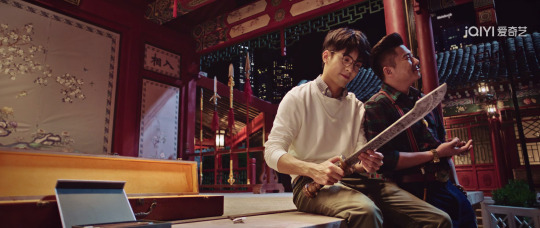

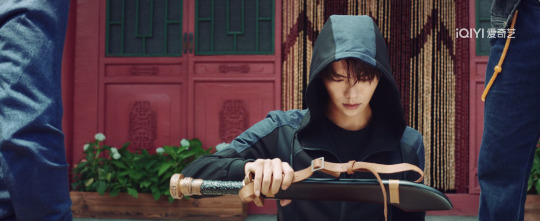

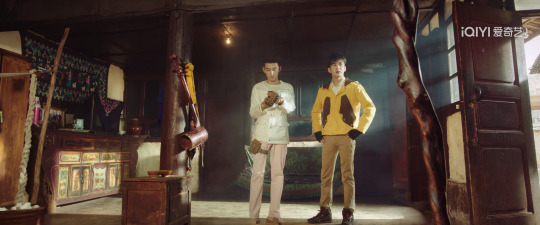
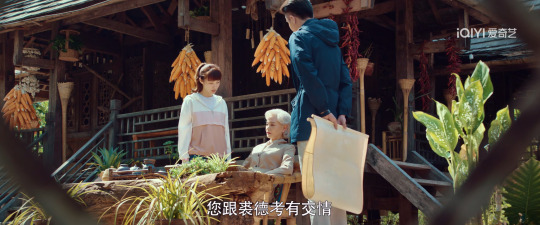
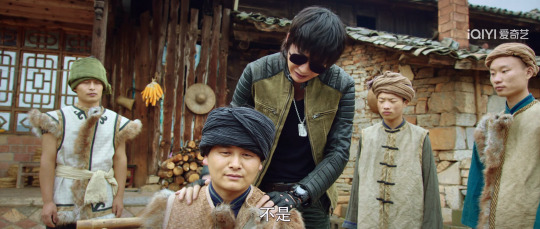
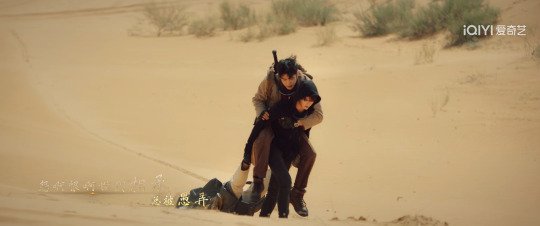



ultimate note 终极笔记
#china#cdrama#ultimate note#dmbj#daomu biji#dao mu bi ji#grave robbers chronicles#pingxie#I read xulei's original text again#I basically don't read fan fiction of pingxie because xulei himself has written enough lol#c纯爱战神,徐磊#do you know the title of the chapter in shahai where wuxie falls off the cliff#玲珑骰子安红豆,入骨相思知不知#líng lóng tóu zǐ ān hóng dòu rù gǔ xiāng sī zhī bù zhī#direct translation is my lovesickness for you is etched in my bones as deeply as a red bean is etched in dice#red beans can mean longing&lovesickness&infatuation to remember fondly a person and were used as love tokens#very famous love poems by tang dynasty poet wen tingyun
214 notes
·
View notes